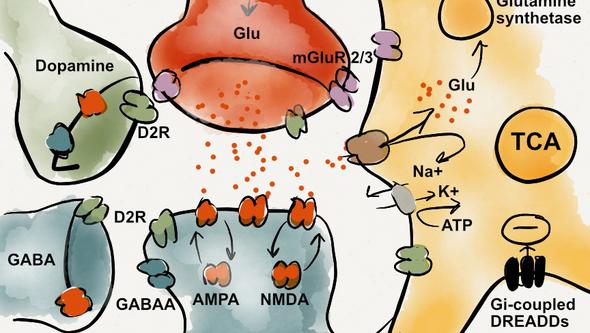
Integrative neuroscience
Short description
The research group is studying how neuronal communication and plasticity in selected brain regions may be sensitive to lifestyle factors and drugs of abuse, including nicotine and alcohol. The group is further outlining how these shifts in neuronal function may promote transitions in behavior.
Research aims
Our research group aims to outline how specific neurocircuits are regulated and how they may contribute to the control over behavior. Especially we are studying how exposure to drugs of abuse, such as nicotine and alcohol, may produce long-term neuroadaptations that may promote drug seeking behavior.
Previous findings
Our research has shown that the effect of nicotine on neuronal circuits is long-lasting, and that nicotine transforms neurotransmission in a specific spatial and temporal sequence. Not only does nicotine affect activity in brain regions involved in reward and the formation of habits, we also found robust transformations in brain-regions of importance for emotions. By inflicting on brain function, nicotine could promote incentive habits and compulsive nicotine taking behavior (addiction), but also increase anxiety levels when the drug is not onboard. In addition, our research has shown that while nicotine in the acute phase facilitates synaptic plasticity, possibly strengthening the learning of the nicotine-taking behavior (habitual smoking), withdrawal impairs synaptic plasticity, possibly reducing the ability to break the habit (stop smoking). We hypothesize that these neurophysiological transformations are neurobiological underpinnings of nicotine dependence. We also postulate that we by restoring neurotransmission in these circuits can regain control over behavior and reduce the risk of relapse.
Ongoing studies
We are now conducting in depth analysis to identify neurotransmitters and signaling pathways that can be manipulated to restore the function of the brain. Especially we have an ongoing translational project where we are assessing the role of lifestyle factors such as physical activity and diet in restoring brain function and reducing the risk for nicotine relapse. While neuronal function is our main interest, we are also studying peripheral transformations, such as changes in cardiovascular function and hematology.

Group members
- Louise Adermark, Docent, Researcher
- Ana Domi, PhD, Postdoc
- Oona Lagström, MD, Doctoral Student
- Erika Lucente, MSc, Doctoral Student
- Davide Cadeddu, Doctoral Student
- Johanna Andersson, Student, Assistant (SU/Sahlgrenska)


